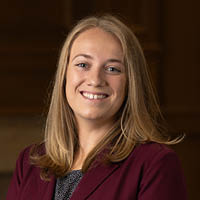Measure Your Organization’s Social Impact
The Clinton School of Public Service is excited to announce the launch of the new Clinton School Impact Center (CSIC).
Leveraging the skills of the school’s talented faculty and professional staff, the CSIC’s mission is to provide rigorous applied research and evaluation services that are accessible to public service organizations. These services will enable organizations to measure their social impact, make informed decisions, and develop programs and policies that best meet the needs of their communities.
Consistent with the mission of the Clinton School of Public Service, the CSIC will work hand-in-hand with community partners to expand their capacity in the areas of research and evaluation, ultimately stewarding positive social impact in Arkansas and beyond.
Under the direction of Dr. Nichola Driver, Executive Director, the CSIC will provide a range of services that are responsive to the needs of community partners.
- Evaluation strategy development
- Asset mapping and needs assessment
- Monitoring and evaluation support
- Community engaged research and evaluation
- Applied research to assess community awareness, needs, perceptions, etc.
- Analysis of existing program data
- Capacity building for monitoring and evaluation
- Data collection to inform program planning and design
- Logic model and theory of change development
Impact Center Leadership

Nichola Driver
Assistant Dean of Impact | Executive Director of the Office of Field Servicenddriver@clintonschool.uasys.edu(501) 683-5215Dr. Nichola Driver is the Assistant Dean of Impact, Executive Director for the Office of Field Service and an Associate Professor at the Clinton School of Public Service, where she has taught Field Research Methods and Program Evaluation.
Driver is a maternal and reproductive health scholar, having published on topics such as attitudes towards contraception among teens and their parents in Arkansas, attitudes towards teen pregnancy among Latinas across the U.S., teen sexual risk behavior, and disparities in maternal parenting stress.
She is also an experienced evaluator, having consulted for several local and state-wide organizations on monitoring and evaluation, including the Arkansas Department of Health, Entergy, UAMS Women’s Health Clinic, Winthrop Rockefeller Institute, Arkansas Human Development Corp, The Contingent, and Northwest Arkansas Community College, among others.
She frequently serves as an invited speaker for external institutions on the topics of monitoring and evaluation, developing indicators that matter, and the importance of logic models in program planning and evaluation.
Driver holds a Ph.D. in Sociology from the University of North Texas and a Master of Public Administration from the University of Arkansas at Little Rock. Driver was also named to the 2024 Class of “40 Under 40” from Arkansas Business.

Katie George
Research & Evaluation Managerkgeorge@clintonschool.uasys.edu(501) 683-5656Katie George, MPS is a researcher and evaluator specializing in public health research and impact evaluation.
A Clinton School graduate, George’s experience includes designing an evaluation plan for a peer-to-peer mental health resource for teens struggling with depression in the Arkansas Delta. This program will soon be implemented across Jefferson County schools. An expert in both qualitative and quantitative international research, she has also evaluated mental health support programs for mothers in Peru.
Prior to the Clinton School, George worked with the Peace Corps in Malawi as a health educator designing and implementing programs related to WASH, malaria, HIV, and nutrition. George also worked with AmeriCorps, and as an advocate at a domestic violence shelter, in which she was responsible for enhancing the health care resources available to victims.

Evanna Ojeda
Research Associateeojeda@clintonschool.uasys.eduEvanna Ojeda is a 2025 graduate of the Clinton School of Public Service, earning her Master of Public Service with a certificate in Program Planning and Evaluation for Social Change.
Ojeda assists with data collection and analysis on several key projects, and brings an expertise in the area of education.
During her time as a Clinton School student, Ojeda served as the Arkansas Education Policy Fellow at the Arkansas Department of Education, where she evaluated the effect of the LEARNS Act on teacher recruitment and retention.
Prior to the Clinton School, Ojeda served with Teach for America in New York City, completed two Fulbright ETAs in Spain, and worked as a Special Education Trainer in the Commonwealth of Dominica as a Peace Corps Response Volunteer.
Impact Center FAQ
We are a multidisciplinary team of Clinton School faculty and staff that provide applied research and evaluation consulting services for the Arkansas community and beyond. We specialize in community-engaged applied research and external evaluations for nonprofits and government agencies.
The CSIC will serve as your partner in progress and impact, regardless of your level of research and evaluation experience. Confused or overwhelmed by evaluation? No problem! We will walk hand-in-hand with you through the process. We are committed to mutually beneficial partnerships that empower our community partners.
The CSIC will provide a range of services that are responsive to the needs of community partners.
- Evaluation strategy development
- Asset mapping and needs assessment
- Monitoring and evaluation support
- Community engaged research and evaluation
- Applied research to assess community awareness, needs, perceptions, etc.
- Analysis of existing program data
- Capacity building for monitoring and evaluation
- Data collection to inform program planning & design
- Logic model and theory of change development
Organizations are welcome to propose additional services and needs, which we will take into consideration, depending on our capacity.
The Clinton School Impact Center (CSIC) encourages and emphasizes participatory and inclusive evaluation approaches that prioritizes the perspectives and needs of the communities being served. With that in mind, we encourage the involvement and input of community members throughout our evaluation processes. We value organizational and community partners as experts in their work and their lived experiences, and we understand that including the voices of these experts leads to more credible and valid final deliverables and greater buy-in and sustainability for the evaluation results.
The Clinton School of Public Service provides opportunities to partner with our students on research and evaluation through our internationally-renowned field service projects. The Clinton School Impact Center, on the other hand, allows organizations to partner with our expert faculty and professional staff. While students may be involved in CSIC projects, unlike field service projects, these projects are not limited to an academic timeline. CSIC projects tend to be shorter or longer in timeline, require more advanced skills than field service projects, and provide more rigorous evaluation products. If you would like to discuss which is most appropriate for your organization, please reach out to us.
Contact us today to schedule time for your complimentary initial 30-minute consultation.
To help us better understand your organization, we ask that you complete and submit the Consultation Request Form. Someone from our team will contact you within 48 hours during business hours. Please be prepared to discuss the specifics of your project, your timeline, budget, and any other relevant information.
You can also email our Executive Director, Nichola Driver at nddriver@clintonschool.uasys.edu.
After you complete the Service Request Form, we will reach out to you within 48 hours to set up a complimentary 30-minute virtual consultation meeting.
To prepare for your 30-minute consultation, please be ready to discuss your project needs, timeline, and budget. We respect the confidentiality of your organization, programs, projects, initiatives, and especially your clients/consumers.
Following the 30-minute consultation, for organizations wishing to proceed with the CSIC services, we will develop a memorandum of understanding (MOU) with a scope of work.
Testimonials
“Thank you so much for sending the survey results. I have downloaded them and found the information incredibly useful! You all did an outstanding job! It has been a pleasure working with you both, and I look forward to future collaborations.”
Dorotha Hall | Executive Director, Destination Transformation
“The team at the Clinton School Impact Center executes at the highest levels of competency, attentiveness, professionalism and skill. In my 20+ year career, I’ve worked with every major U.S. consulting firm, plus numerous boutique firms. I can confidently recommend the Impact Center as a collaborate and effective partner in community/grant research work.”
Jerome Strickland | Executive Director, The Contingent Arkansas